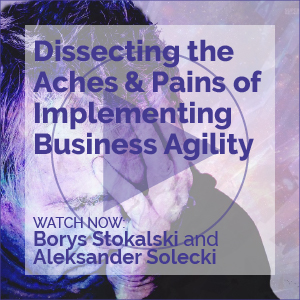IBM and PeopleSoft
On Tuesday last week, IBM and PeopleSoft announced the "Most Significant Enterprise Applications Alliance in Company History." I think the statement's a little bit over the top, but it's still an interesting announcement.
Post-Implementation Business Impact Analysis
Post-Implementation Business Impact Analysis
Developing a Project Management Culture
IBM and PeopleSoft
On Tuesday last week, IBM and PeopleSoft announced the "Most Significant Enterprise Applications Alliance in Company History." I think the statement's a little bit over the top, but it's still an interesting announcement.
IBM and PeopleSoft
On Tuesday last week, IBM and PeopleSoft announced the "Most Significant Enterprise Applications Alliance in Company History." I think the statement's a little bit over the top, but it's still an interesting announcement.
IBM and PeopleSoft
On Tuesday last week, IBM and PeopleSoft announced the "Most Significant Enterprise Applications Alliance in Company History." I think the statement's a little bit over the top, but it's still an interesting announcement.
IBM and PeopleSoft
On Tuesday last week, IBM and PeopleSoft announced the "Most Significant Enterprise Applications Alliance in Company History." I think the statement's a little bit over the top, but it's still an interesting announcement.
The Extreme Project Manager's Role
Bidding Work: Lessons Learned
We are often asked for estimates to build a system. Even though the system is complex, we are prodded, "What will it take?" And, to our regret, the estimate -- once out of our mouth -- becomes a contract. I had an experience recently where another professional showed me another way, and I learned that I was pleased with his approach.
Leadership Trends
Every time I speak to people about what it takes to be a good CIO or CTO, I hear myself talking about the same things -- as I watch my audience respond with weird body language, like maybe I have no idea what I'm talking about (or maybe, just maybe, it's 2025 and I'm boring the audience with what everyone already knows is true).
Leadership Trends
Every time I speak to people about what it takes to be a good CIO or CTO, I hear myself talking about the same things -- as I watch my audience respond with weird body language, like maybe I have no idea what I'm talking about (or maybe, just maybe, it's 2025 and I'm boring the audience with what everyone already knows is true).
Leadership Trends
Every time I speak to people about what it takes to be a good CIO or CTO, I hear myself talking about the same things -- as I watch my audience respond with weird body language, like maybe I have no idea what I'm talking about (or maybe, just maybe, it's 2025 and I'm boring the audience with what everyone already knows is true).
Leadership Trends
Every time I speak to people about what it takes to be a good CIO or CTO, I hear myself talking about the same things -- as I watch my audience respond with weird body language, like maybe I have no idea what I'm talking about (or maybe, just maybe, it's 2025 and I'm boring the audience with what everyone already knows is true).
Leadership Trends
Every time I speak to people about what it takes to be a good CIO or CTO, I hear myself talking about the same things -- as I watch my audience respond with weird body language, like maybe I have no idea what I'm talking about (or maybe, just maybe, it's 2025 and I'm boring the audience with what everyone already knows is true).
What Is So Difficult About Project Management?
It should be fairly straightforward for a very smart, highly motivated project manager to successfully deal with the three elements of a project -- scope, time, and cost -- right? Then why are so many information technology (IT) projects less than successful, or outright failures?


